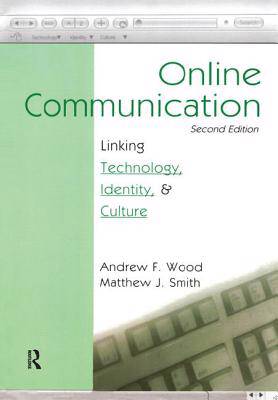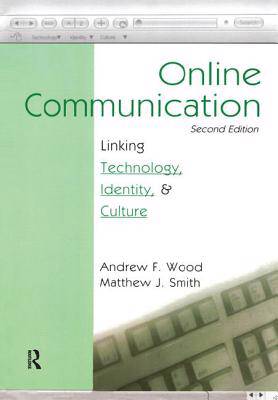
- Retrait gratuit dans votre magasin Club
- 7.000.000 titres dans notre catalogue
- Payer en toute sécurité
- Toujours un magasin près de chez vous
- Retrait gratuit dans votre magasin Club
- 7.000.0000 titres dans notre catalogue
- Payer en toute sécurité
- Toujours un magasin près de chez vous
263,95 €
+ 527 points
Format
Description
Online Communication provides an introduction to both the technologies of the Internet Age and their social implications. This innovative and timely textbook brings together current work in communication, political science, philosophy, popular culture, history, economics, and the humanities to present an examination of the theoretical and critical issues in the study of computer-mediated communication. Continuing the model of the best-selling first edition, authors Andrew F. Wood and Matthew J. Smith introduce computer-mediated communication (CMC) as a subject of academic research as well as a lens through which to examine contemporary trends in society. This second edition of Online Communication covers online identity, mediated relationships, virtual communities, electronic commerce, the digital divide, spaces of resistance, and other topics related to CMC. The text also examines how the Internet has affected contemporary culture and presents the critiques being made to those changes. Special features of the text include: Hyperlinks--presenting greater detail on topics from the chapterEthical Ethical Inquiry--posing questions on the nature of human communication and conduct onlineOnline Communication and the Law--examining the legal ramifications of CMC issues Advanced undergraduates, graduate students, and researchers interested in the field of computer-mediated communication, as well as those studying issues of technology and culture, will find Online Communication to be an insightful resource for studying the role of technology and mediated communication in today's society.
Spécifications
Parties prenantes
- Auteur(s) :
- Editeur:
Contenu
- Nombre de pages :
- 264
- Langue:
- Anglais
- Collection :
Caractéristiques
- EAN:
- 9781138436541
- Date de parution :
- 12-07-17
- Format:
- Livre relié
- Format numérique:
- Genaaid
- Dimensions :
- 178 mm x 254 mm
- Poids :
- 452 g

Les avis
Nous publions uniquement les avis qui respectent les conditions requises. Consultez nos conditions pour les avis.






